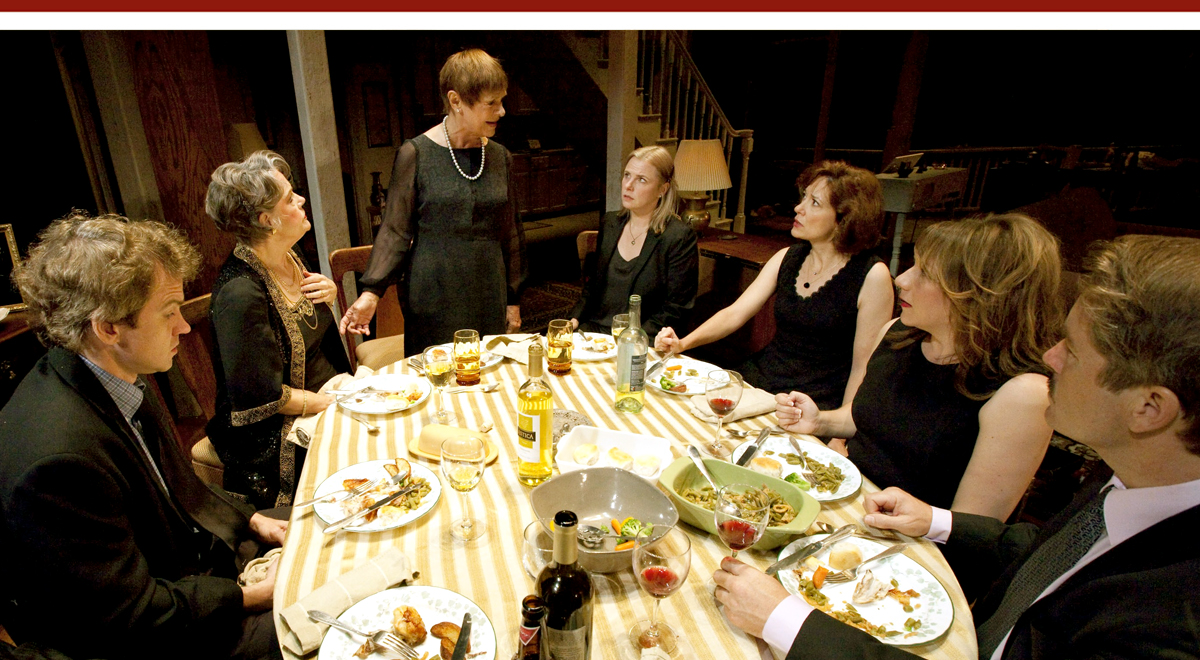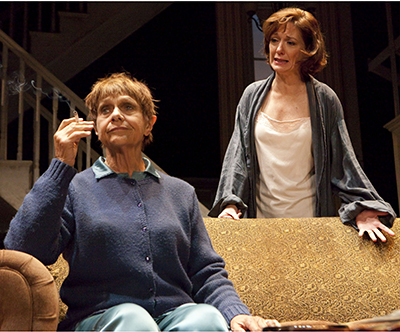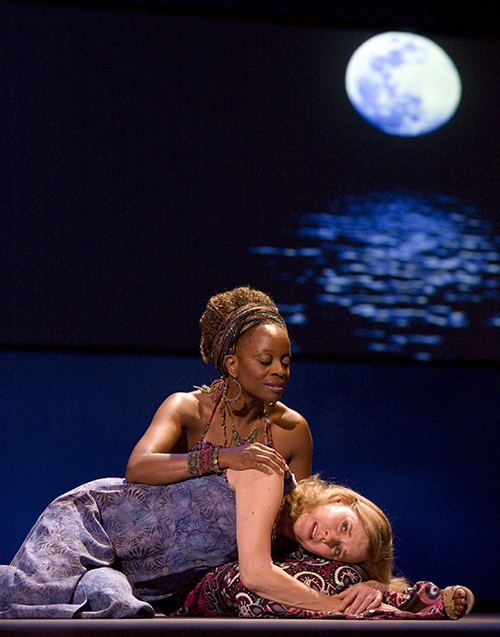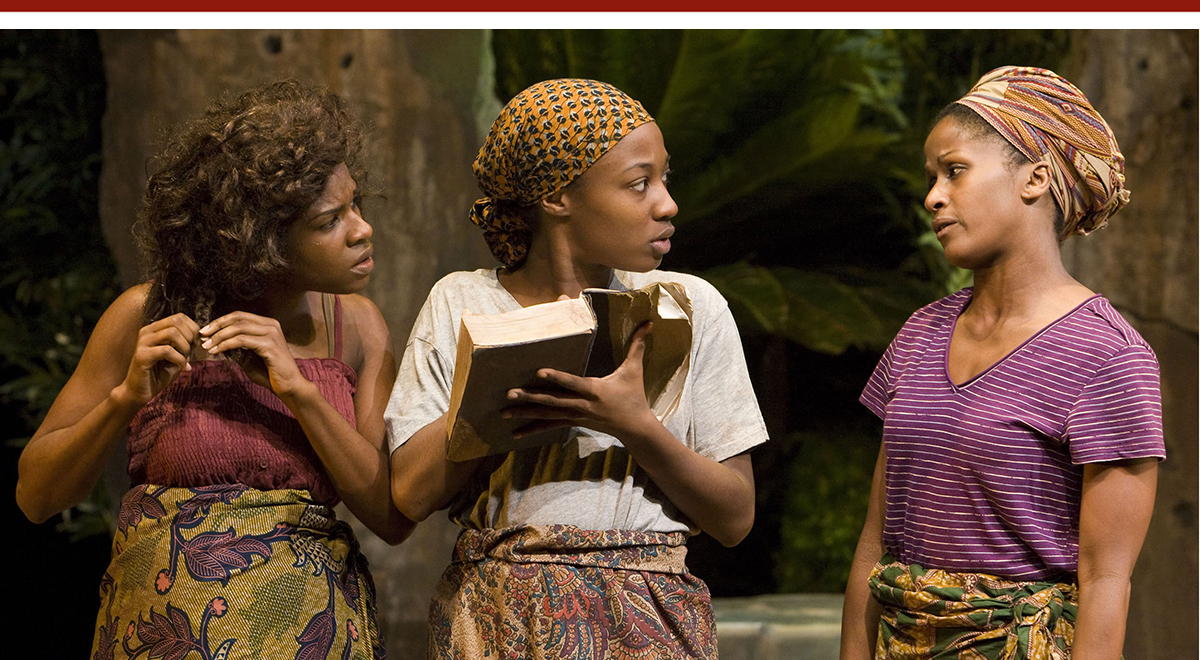SEPTEMBER 2009
Click title to jump to review
AUGUST: OSAGE COUNTY by Tracy Letts | Ahmanson Theatre
ECLIPSED by Dunai Gurira | La Jolla Playhouse
MATTHEW MODINE SAVES THE ALPACAS by Blair Singer | Geffen Playhouse
THE NIGHT IS A CHILD by Charles Randolph-Wright | Pasadena Playhouse

The cruelist mouth
A strange job interview begins Tracy Letts’ August: Osage County (at the Ahmanson Theatre through October 18). Beverly Weston (Jon DeVries), an alcoholic former professor whose poetry writing dried up decades ago, is hiring a housekeeper to help with his wife, Violet (Estelle Parsons). Vi, a longtime prescription drug addict, has turned her diagnosis of oral cancer into a license to overdose.
As Vi sleeps off the day’s stupor, Bev sits with Johnna (DeLanna Studi), to go through the list of duties and a fifth of Jim Beam. He talks of his three estranged adult daughters before drifting into a soliloquy about the power of American poetry, ominously aligning himself with two of its tragic stars: Missouri- born T.S. Eliot, whose wife, Viv, ended her days in an asylum, and fellow Oklahoman John Berryman, who committed suicide. Native American Johnna, with a centuries-old tradition of looking for truth in airy white speeches, listens politely.

With Bev reciting a line from Eliot’s "The Hollow Men" to end the scene, Letts sets his play’s footprint. Like Scenic Designer Todd Rosenthal’s three-story Weston home, it presents a spacious framework to cage the 13 folks who will flesh out this unsentimental vision of contemporary American families. It is a world of intimates distanced by tightly held secrets, of generations passing on the worst of their elders, and surprisingly little invocation of God. It echoes O’Neill and Chekhov before clearing its own voice, filled with literary resonance and accented with enough sharp contemporary satire to engage mainstream audiences for three-and-a-half hours (two intermissions).
It is high accomplishment for a play freighted with extraordinary acclaim to still amaze. During a Broadway run that ended in June, August earned the 2008 Pulitzer Prize for Drama, five Tony Awards (including play, director and lead for Deanna Dunagan as Violet), and Best Play Awards from Theater World and the Drama Desk. Its tour, which won high praise in London and Denver, now comes to L.A.
Anna D. Shapiro has staged the piece to clip along, keeping Letts’ many mini-themes spinning as her large cast lands every shot of black comedy. A week after Johnna’s interview, Bev disappears. The three sisters and their loved ones return from dysfunctional diaspora intent on suppressing their animosities long enough to support their distraught mother in a time of need. But the stifling house is quickly filled with spiteful truth telling and revelations - mostly from the acid-tongued Violet.
Middle daughter Ivy (Angelica Torn), divorced and childless at 43, has remained within shouting distance to become the begrudging, default caretaker. She arrives first, followed by the eldest, Barbara (Shannon Cochran), her literature professor husband, Bill (Jeff Still), and their precocious 14-year-old, Jean (Emily Kinney). Youngest daughter Karen (Amy Warren) flies in from Miami with a new fiancée – a suspicious piece of work named Steve (Laurence Lau). Violet’s equally damaged sister Maddie Fae (Libby George) and her husband Charlie Aiken (Paul Vincent O’Connor), live only 90 minutes away, and are already there. Their 37-year-old son "Little" Charles (Stephen Riley Key) will arrive later.
Parsons renders a frightening, pathetic Vi. Between her drug-addled zombie and her vicious matriarch, she gives plenty of clues as to how a mother’s instincts shift from protecting her children to attacking them to protect her own weaknesses. As Barbara, Cochran traces the biggest arc. She offers a gallery of adult child’s roles: accommodating, loving, beseeching and finally, overpowering. Her frustrating relationships with husband and daughter honestly portray her as victim and victimizer.
Of the rest of the cast, Torn is a particular standout as the tortured Ivy while Warren’s Karen shows how being youngest has left her with a tendency to use childishness to get her way. Studi nimbly allows her character to function in play world and metaphor. The men manage to dignify Letts’ "Hollow Men" theme without imploding. Their shared emptiness is crippling in a variety of forms, yet they function as completely recognizable. As damaged "Little Charles," Key resists the invitation to overdue, showing us the isometrics of one always working to suppress natural inclinations.
Costumer Ana Kuszmanic adds fine touches. She fits Bev with footwear that, after a speech of Vi's, provides a backhanded clue to their twisted relationship. Ann G. Wrightson's lights help define rooms in the wall-less ground floor and Richard Woodbury gives the play a realistic sonic environment. David Singer’s original music, which launches the show on boozy clarinet, always complements Letts’ themes.
Letts uses a real Native American tradition as an important metaphor upon which to hang one cautionary sign. During their entire life, the Cheyenne wear a pendant necklace to protect their spirits from getting separated, and entering the afterlife to wander alone. Johnna explains that hers contains the coiled, prenatal tether that once bound her with her mother. The Westons' lack of that fundamental connection resonates as the play ends, with a whimper. After everyone has left, Vi weeps the final lines of "The Hollow Men" into Johnna's lap. Letts quietly leaves us with volumes to talk about for years to come and the American theater with an authentic new classic.
top of page
AUGUST: OSAGE COUNTY
by TRACY LETTS
directed by ANNA D. SHAPIRO
AHMANSON THEATRE
September 8-October 18, 2009
(Opened, rev’d 9/9)
CAST Estelle Parsons, Shannon Cochran, Jon DeVries, Libby George, Stephen Riley Key, Emily Kinney, Laurence Lau, Marcus Nelson, Paul Vincent O’Connor, Jeff Still, DeLanna Studi, Angelica Torn, Amy Warren; u/s Avia Bushyhead, Stephen D’Ambrose, Barbara Kingsley, Bryn Magnus, Kim Martin-Cotton
PRODUCTION Todd Rosenthal, set; Ana Kuzmanic, costumes; Ann G. Wrightson, lights; Richard Woodbury, sound; David Singer, music
PRODUCERS Jeffrey Richards, Jean Doumanian, Steve Traxler, Jerry Frankel, Jennifer Manocherian, The Weinstein Company, Ronald Marc Frankel/Barbara Freitag, Rick Steiner/Staton Bell Group present the Steppenwolf Theatre Company production. Commissioned and premiered by Steppenwolf
Stephen Riley Key, Libby George, Estelle Parsons, Angelica Torn, Shannon Cochran, Amy Warren and Laurence Lau, top; Inset: Parsons and Cochran
Robert J. Saferstein
The Power Vacuum Sucks
Dunai Gurira is the U.S.-born, Zimbabwe-raised writer-actor who, with Nikkole Salter, created In the Continuum, that rare phenomenon that achieves distinction as both superior drama and social outcry. Given that accomplishment, it is with special interest that one approaches the West Coast premiere of Gurira’s Eclipsed, now at the Kirk Douglas Theatre (through October 4).
While it is not the performance marvel of Continuum – in which Gurira and Salter told their urgent story through the dozen distinct characters they created – “Eclipsed” is extremely powerful theater with just as fierce a call to awareness. Three years after “Continuum” represented the innocent women who have AIDS brought back to their beds by cheating lovers, “Eclipsed” – also directed by Robert O’Hara – looks into the shadows of war-torn Liberia at how women pulled into the conflict adapt. They are played by Edwina Findley, Miriam F. Glover, Michael Hyatt, Kelly M. Jenrette and Bahni Turpin.
Beginning in the late ‘80s, 14 years of civil war and incursions into neighboring Sierra Leone destabilized Liberia. More than 250,000 were killed and another two-thirds of the population lost their homes and villages. In addition to the loss of life and property, boys and girls lost their innocence, conscripted into battle and brutality. That Gurira has another urgent topic can be confirmed daily, in the ongoing war crimes trial of Former President Charles Taylor, who vehemently denies that the children fought.
Gurira sets her action in “the compound” of a rebel camp. It’s not clear whose structure this was, or how damaged it has been, or exactly where or when the play is taking place. Instead, our awareness is filtered through the perceptions of the characters. The compound, which is steps away from the commanding officer's quarters, is where the "wives" of the CO, cook, clean and await his call for sex. They are not sure exactly how long the war has been going on, or the others' given names and ages, or, for that matter, their own ages. By comparison, while the women are having their identities erased, the male are engorged with a sense of purpose and power. (And, lest anyone think Africans invented this treatment, European-descended readers should look at records of their own ancestry to see how many blank spaces exist where the names of wives and mothers should be.)
The play opens as a woman in her mid-20s (Bahni Turpin) tends to the hair of a girl in her late teens (Edwina Findley). The young girl snarls up at her attendant in a scene of domestic friction familiar to every family containing mothers and daughters. But this is not a normal family, we soon learn. It is instead a thrown-together collection of women who have been gathered by the CO, a powerful rebel we do not see or even hear. In this microcosm of the compound, the women are forced to create a sub-culture that preserves some remnants of their identities as women, mothers, daughters, sisters and allows them to function within the violent chaos of a paramilitary environment.
In addition to having had their names exchanged for their ordinal “marriage” rank, their clothing and possessions are spoils of their keepers' recent killings, dropped into the compound for them to fight over. It is Turpin's #1 who summons up a call for fairness. When the newest arrival, #4 (Miriam F. Glover), shows she has crude reading skills, she is drafted by #1, showing those instinctive signs of forming a nurturing family, into reading sections of a pillaged book about an American president.
Two paths will present themselves to the women: nurturing, self-development in the form of learning to read and help others; and self-preservation through losing themselves as killers in the men's war. One way promises better clothes and goods, while the other probably means ostracizing or death. One of the wives, #2 (Kelly M. Jenrette), has already taken the woman warrior's path. As a result she dresses better, carries a rifle, and speaks with authority. She is ought to enlist young #4 and appears to have succeeded.
Because these are uneducated women under extreme pressure, there is only so much material Gurira can realistically give them to discuss and as a result much of the play is bickering and posturing and that can become wearing. But pulling back for the big picture continues to reveal the development of an artist with her own great instincts for nurturing her audiences. Her writing again makes it worth a trip to Culver City. (Those missing her acting can pick up a dvd of The Visitor, in which she co-stars with Oscar-nominated Richard Jenkins.)
top of page
ECLIPSED
by DUNAI GURIRA
directed by ROBERT O'HARA
KIRK DOUGLAS THEATRE
September 13-October 4, 2009
(Opened 9/20, rev’d 9/25)
CAST Edwina Findley, Miriam F. Glover, Michael Hyatt, Kelly M. Jenrette, Bahni Turpin
PRODUCTION Sibyl Wickersheimer, set; Alex Jaeger, costumes; Christopher Kuhl, lights; Adam Phalen, sound; Kathryn Bostic, music; Joel Goldes, dialect; Steve Rankin, fights; Amy Bristol Brownewell/Elle Aghabala, stage management
HISTORY Developed at McCarter and Ojai Playwrights Conference; premiered at Woolly Mammoth Theatre (DC), August 2009 • West Coast Premiere
Edwina Findley, Miriam F. Glover and Bahni Turpin
Craig Schwartz
Temple of Doom
Matthew Modine Saves the Alpacas, now premiering at the Geffen Playhouse (through October 18), is a stage farce for film fans. It is a play about a once-proud movie star selling what’s left of his soul to regain his celebrity and taste A-list superstardom. In the play, Modine employs a publicity stunt to get attention. Through the play, he and the Geffen team ignored actor and ignored art form to get an audience. It’s unlikely that any of their fortunes will rise on this under-imagined script by Blair Singer.
While Singer’s script creaks with contrivance and cliché, John Rando’s staging compounds the problems by feeling both under-directed and under-rehearsed. There is tentativeness to the opening exchanges, symptomatic of productions that lost rehearsal time to conflicting work schedules. But, to Rando’s defense, there’s not a lot of flow to the dialogue, and no real points of interest for the actors to hang their characterizations on.
It won’t surprise fans of Matthew Modine that he is good-natured enough to be the brunt of this one-joke comedy. It might surprise them that he got involved with a project that misses the mark. Despite a bio full of fine performances – Birdy, Married to the Mob, Full Metal Jacket and Memphis Belle among them – Modine happily plays a has-been whom no one remembers. (A program ad for his upcoming film softens the blows.)
When the play begins, Modine, looking like "The Dude" from the Coens’ Big Kowalski (costumes by the great Robert Blackman) is meeting with super-publicist Whimberly North (Peri Gilpin) and her assistant Jeffrey (French Stewart). North looks half-a-century younger than her age thanks to major surgery and Botox. There are lots of jokes about the surgical sculpting. For those who still find that subject funny, a typical exchange has North asking rhetorically, "Do I look scared?," and being told "You don’t seem to have any expressions."
This most powerful promoter chooses clients based on their sex appeal. Her measure of their potential is, as she puts it, "gynecological." If she doesn’t moisten, she won’t back him. Modine leaves her dry, so she shows him the door. But, he is determined and something about him eventually finds her dew point. Reading through her file of headline-grabbing stunts gives Singer a chance to lampoon shallow celebrity efforts like helping victims of Katrina, adopting African orphans, supporting AIDS, etc. None interest her until Jeffrey finds a novel idea, saving Equador’s Alpacas! And, faster than you can Mount Chimbarazo, we’re in South America with Modine looking like Indiana Jones.
The actors, particularly Stewart as both North’s man Friday and a U.N. representative, redeem themselves, though Gilpin’s tendency to flat line her sentences deadens dialogue than needs all the energy it can get. And, it rings particularly shallow so soon after Julie White brought her landmark creation to town in Douglas Carter Beane’s The Little Dog Laughed. Still, Modine does what he can. It’s hard to fault a guy who is offered a project that goes beyond having his name above the title.
top of page
MATTHEW MODINE SAVES THE ALPACAS
by BLAIR SINGER
directed by JOHN RANDO
GEFFEN PLAYHOUSE
September 8-October 18, 2009
(Opened 9/16, rev’d 9/17)
CAST Matthew Modine, Peri Gilpin, French Stewart, Edward Padilla, Mark Damon Espinoza, Reggie De Leon, Mark Fite, Kevin Nooncester
PRODUCTION Beowulf Boritt, set; Robert Blackman, costumes; Jeff Croiter, lights; Jon Gottlieb, sound; James T. McDermott/Jennifer Brienen, stage management; Steve Rankin, fight direction
PRODUCERS Jeffrey Richards, Jean Doumanian, Steve Traxler, Jerry Frankel, Jennifer Manocherian, The Weinstein Company, Ronald Marc Frankel/Barbara Freitag, Rick Steiner/Staton Bell Group present the Steppenwolf Theatre Company production. Commissioned and premiered by Steppenwolf.
French Stewart, Peri Gilpin and Matthew Modine
Michael Lamont
The parent's nightmare
An engaging sense of mystery permeates Sheldon Epps’ staging of Charles Randolph-Wright’s ‘The Night is a Child,’ now at the Pasadena Playhouse (through October 4) after premiering at Milwaukee Rep in March 2008. From the first scene,in which a middle-aged woman is soaking up the sunny dispositions of residents on her first day in Rio, something portentous seems to lurk just out of sight.

Randolph-Wright, with impressive credits in every aspect of theater, was last in Pasadena with Cuttin’ Up, a very successful script that uses a barbershop as the setting for a celebration of the customs and characters that make these central parts of African-American communities.
Harriet (JoBeth Williams), we will learn, is both fulfilling a life-long dream of visiting Ipanema and trying to escape a nightmarish family tragedy back in Boston. The family and the tragedy will pursue her, however, and she will be forced to confront them both.
Cuttin' Up was based on a single book of interviews with Black barbers and their customers. That helped set boundaries within which the playwright focused his story. Here, without that focus, Randolph-Wright mixes such huge themes and ideas that we feel none achieves its full impact. What Harriet is running from and what encounters in her escape are so enormous, they seem slighted by use only as plot points in a story about a woman accepting her need to get on with her life. Certainly the elephantine tragedy that sent her packing will be there when she gets home. Getting to a point where she can dismiss it may only worsen her standing in the community.
When we meet Harriett, she has landed in Rio, embracing the anonymity and soothing sounds that drew her here without telling her two adult children where she was going. We meet the kids, Jane (Monette Magrath) and Bryan (Tyler Pierce), as they begin the process of determining their mother is missing, then reporting her, then guessing where she has gone and following her.
What Harriett experiences in Rio is a mixture of dream fulfillment and dream world intrusion. She quickly meets a free spirit in Bia (Sybyl Walker), a local who studied to become a physician at Harvard. She books a room in a swanky hotel run by Joel (Maceo Oliver, who also appeared in Cuttin' Up) and is soon seeing visions of another son, Michael (Bryan’s twin, also played by Pierce). That these visions could be her own mental state, or her proximity to Brazil’s Candomblé religion – a cousin of Voodoo – add to the play’s healthy sense of uncertainty and mystery.
Yael Pardess' clean, open set features twin projection screens that carry exquisite video support by Jason Thompson. Pardess employs the full stage and even breaks into the auditorium for some of the action. Admittedly, economy may have overruled design in having the Candomblé unit in front of the proscenium, where it does not need to be moved on and off stage. However, having that foreboding presence of the temple engulf Harriet, closing off the openness of the set, would have better established the sense of darkness closing in and threatening her.
The triumphant end to Harriet’s journey is audience-pleasing, but that presence of events outside the characters' control give the play a passive voice it never overcomes. The elements are certainly here, and though they do not produce the gripping experience they might, they do offer a great showcase for Williams – whose last appearance was the triumphant
top of page
THE NIGHT IS A CHILD
by CHARLES RANDOLPH-WRIGHT
directed by SHELDON EPPS
PASADENA PLAYHOUSE
September 13-October 4, 2009
(Opened 9/20, rev’d 9/25)
CAST JoBeth Williams, Sybyl Walker, Maceo Oliver, Monette Magrath, Tyler Pierce, Armando McClain
PRODUCTION Sibyl Wickersheimer, set; Alex Jaeger, costumes; Christopher Kuhl, lights; Adam Phalen, sound; Kathryn Bostic, music; Joel Goldes, dialect; Steve Rankin, fights; Amy Bristol Brownewell/Elle Aghabala, stage management
HISTORY Developed at McCarter and Ojai Playwrights Conference; premiered at Woolly Mammoth Theatre (DC), August 2009 • West Coast Premiere



